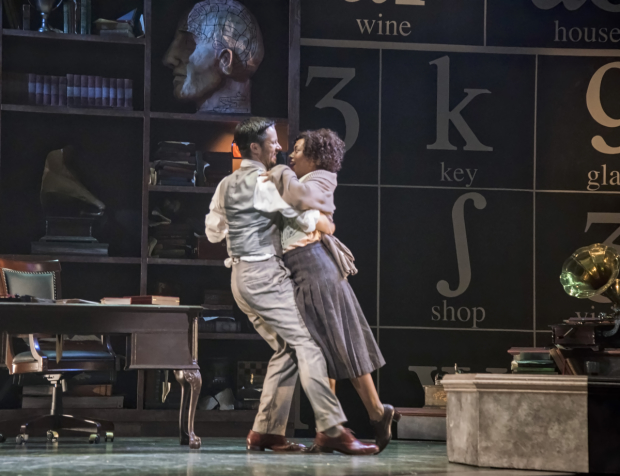
(© Stan Barouh)
Adapted from George Bernard Shaw's play Pygmalion, My Fair Lady was written in 1956 by Alan Jay Lerner, who also wrote the brilliant lyrics, with unforgettable music by Frederick Loewe. While the original took place in Edwardian London, the Olney Theatre Center's version has moved the action up to 1921, allowing for the women's suffrage movement to subtly influence the look and feel of the production.
The play begins in Covent Garden, with a mix of people plying their trades. Among the poorest of those is Eliza Doolittle, a cockney flower seller. Professor Henry Higgins, a phoneticist, talks to Eliza and makes notes of her pronunciation, trying to determine where she was born. He mocks her speech, mourning the fact that many English people don't speak properly. Higgins also meets up with Colonel Pickering, a fellow phoneticist. As Higgins leaves Covent Garden, he tosses Eliza a few coins out of sympathy. Eliza thinks about how her life could be better ("Wouldn't It Be Loverly?").
The next day, fed up with her pauper-like existence, Eliza goes to Higgins's home to tell him that she wants language lessons so she can be an assistant at a flower shop. Higgins makes a wager with Pickering that in six months he will be able to make people think Eliza is royalty. Pickering agrees to his bet. From then on, Eliza, Higgins, and Pickering work on turning Eliza into a lady. To test his transformation skills, Higgins takes Eliza to a ball, where Eliza convinces everyone that she is not only wellborn, but of royal blood. Higgins wins his bet and crows about his big win, without giving Eliza any credit. Despite his ruthless egotism, Higgins finally admits to feeling something for Eliza in the gentle "I've Grown Accustomed to Her Face."
Eliza Doolittle is played with spunk and attitude by Brittany Campbell, whose operatic training shines through as soon as she casts off her cockney flower-girl persona. Her soprano is clear and rich, and she imbues each song with heart. Campbell moves beautifully, dancing the role just as well as she sings it. As Henry Higgins, Danny Bernardy is a good foil for Campbell. Bernardy's voice is pleasant, he is a smooth dancer, and he manages to make Higgins' sense of superiority over women related more to his self-ignorance rather than to cruelty.
Todd Scofield is excellent as Colonel Pickering, playing him as a man who shows early on that he has a paternal affection for Eliza. Chris Genebach portrays Eliza's boozy father. He brings particularly good energy to his two main numbers: "With a Little Bit of Luck" and "Get Me to the Church on Time."
Valerie Leonard doubles nicely in the roles of Henry's wealthy, liberated mother and his rather protective housekeeper, Mrs. Pearce. As Freddy Eynsford-Hill, a wealthy young man who falls desperately in love with Eliza at first sight, Benjamin Lurye has a powerful voice, although his English occasionally sounds a little too overeducated.
Alan Souza deftly directs the musical with a light comedic touch. Souza is helped immensely by the choreography of Grady McLeod Bowman, who has invented new dances for the familiar songs. Together, they make the modest ensemble of eight seem like a chorus from Aida.
Scenic designer James Fouchard uses several simple set pieces to convey Covent Garden, Mrs. Higgins' garden, and Higgins' office (which is the most traditional set in the bunch and contains endless Victrolas and recording devices set against a floor-to-ceiling grid of vowels and diphthongs).
Costume designer Pei Lee has invented 1920s-inspired costumes for the women. At the Ascot races, the colors are wild (from raspberry to chartreuse), the women's hats are several feet high, and their skirts reflect the shorter flapper look. Music director Christopher Youstra's leadership of the 11-piece orchestra is lively and precise.
While many productions of My Fair Lady end with uncertainty as to whether Eliza stays with Higgins or not, this production offers a hilarious new take on Eliza's conflicting love for Higgins and her need for independence. It's just the right tone for a fresh and sassy look at a beloved musical.









